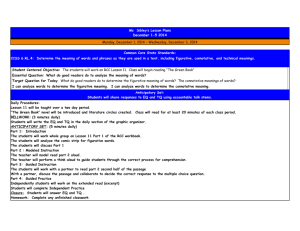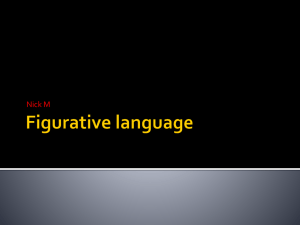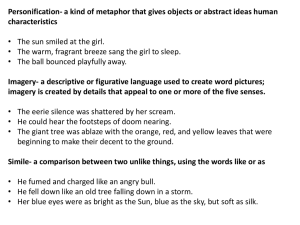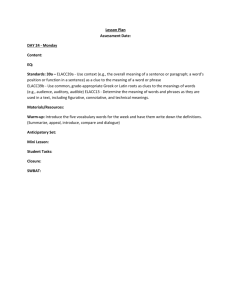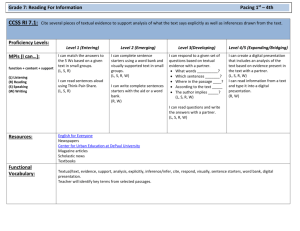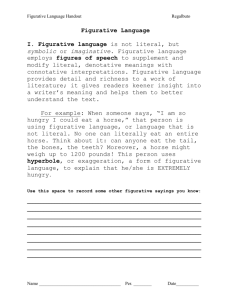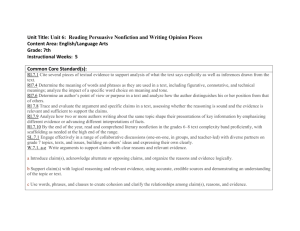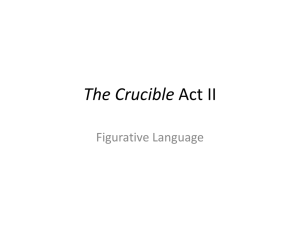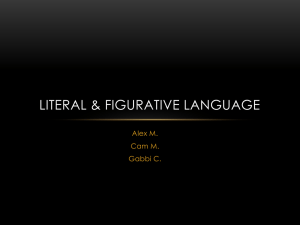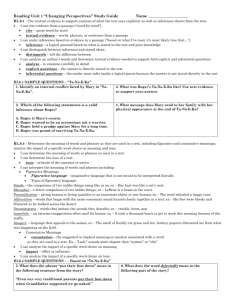Ms. Sibley`s Lesson Plans November 17
advertisement
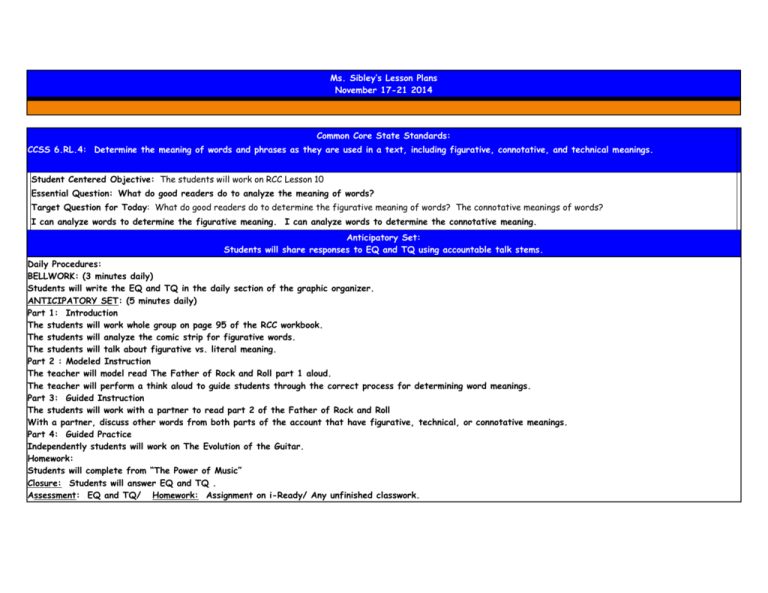
Ms. Sibley’s Lesson Plans November 17-21 2014 Common Core State Standards: CCSS 6.RL.4: Determine the meaning of words and phrases as they are used in a text, including figurative, connotative, and technical meanings. Student Centered Objective: The students will work on RCC Lesson 10 Essential Question: What do good readers do to analyze the meaning of words? Target Question for Today: What do good readers do to determine the figurative meaning of words? The connotative meanings of words? I can analyze words to determine the figurative meaning. I can analyze words to determine the connotative meaning. Anticipatory Set: Students will share responses to EQ and TQ using accountable talk stems. Daily Procedures: BELLWORK: (3 minutes daily) Students will write the EQ and TQ in the daily section of the graphic organizer. ANTICIPATORY SET: (5 minutes daily) Part 1: Introduction The students will work whole group on page 95 of the RCC workbook. The students will analyze the comic strip for figurative words. The students will talk about figurative vs. literal meaning. Part 2 : Modeled Instruction The teacher will model read The Father of Rock and Roll part 1 aloud. The teacher will perform a think aloud to guide students through the correct process for determining word meanings. Part 3: Guided Instruction The students will work with a partner to read part 2 of the Father of Rock and Roll With a partner, discuss other words from both parts of the account that have figurative, technical, or connotative meanings. Part 4: Guided Practice Independently students will work on The Evolution of the Guitar. Homework: Students will complete from “The Power of Music” Closure: Students will answer EQ and TQ . Assessment: EQ and TQ/ Homework: Assignment on i-Ready/ Any unfinished classwork. Ms. Sibley’s Lesson Plans Thursday, November 20, 2014 Common Core State Standards: CCSS 6.RL.4: Determine the meaning of words and phrases as they are used in a text, including figurative, connotative, and technical meanings. Student Centered Objective: The students will work on RCC Lesson 10 Essential Question: What do good readers do to analyze the meaning of words? Target Question for Today: What do good readers do to determine the figurative meaning of words? The connotative meanings of words? I can analyze words to determine the figurative meaning. I can analyze words to determine the connotative meaning. Bellwork: Students will answer EQ and TQ in their organizers. Anticipatory Set: The teacher will ask students to work with a partner to discuss today’s target question. Procedures: Part 5: Common Core Practice The teacher will review the “from The Power of Music” passage and responses from Monday’s homework. Using the promethean board, students will justify their responses. Activity: 1.The students will write a saying that has a figurative meaning. The student will write the literal meaning of the saying or quote. The student will then illustrate the literal meaning on paper. Closure: Students will respond to TQ. Assessment: TQ-EQ Homework: Complete i-Ready blue tab assignments. Study Lessons 7-9 for interim assessment Friday. Highlight at least one item per lesson that you are having difficulty on. Highlight one item that you feel like you could adequately explain to the class. Ms Sibley’s Lesson Plans Tuesday, November 18, 2014 Common Core State Standards: CCSS 6.RL.4: Determine the meaning of words and phrases as they are used in a text, including figurative, connotative, and technical meanings. Student Centered Objective: The students will work on RCC Lesson 10 Essential Question: What do good readers do to analyze the meaning of words? Target Question for Today: What do good readers do to determine the figurative meaning of words? The connotative meanings of words? I can analyze words to determine the figurative meaning. I can analyze words to determine the connotative meaning. Anticipatory Set: Sharpen pencil. Take out highlighters. Review test taking strategies Procedures: Bellwork: Answer TQ and EQ through teacher guided discussion Students will take DCA 2.1 Closure: Students will respond to the EQ and TQ in their organizers. Assessment: student participation in activity Homework: Pack earbuds for i-Ready tomorrow! Ms. Sibley’s Lesson Plans Wednesday, November 19, 2014 Common Core State Standards: CCSS 6.RL.2: Provide a summary of the text distinct from personal opinions or judgments. CCSS RI.6.3 Describe how a particular story’s or drama’s plot unfolds in a series of episodes as the plot moves toward a resolution. CCSS 6 RL 2Determine a theme or central idea of a text and how it is conveyed through particular details. Student Centered Objective: The students will work on i-Ready Essential Question: How does technology enhance my learning experience? Target Question for Today: How can i-Ready help me to be a more successful student? I can complete my i-Ready assignments so that I can be a more successful student. Anticipatory Set: Students will respond to the EQ and TQ Daily Procedures: I-Ready Closure: Students will answer EQ and TQ . Assessment: EQ and TQ/ Homework: Assignment on i-Ready/ Any unfinished classwork. Study for Interim Assessment lessons 7-9 Ms. Sibley’s Lesson Plans Friday, November 21, 2014 Common Core State Standards: CCSS 6.RL.2: Provide a summary of the text distinct from personal opinions or judgments. CCSS RI.6.3 Describe how a particular story’s or drama’s plot unfolds in a series of episodes as the plot moves toward a resolution. CCSS 6 RL 2Determine a theme or central idea of a text and how it is conveyed through particular details. Student Centered Objective: The students will read “The Green Book” in literature circles. Essential Question: What do good readers do when reading in a group? Target Question for Today: What are signs of a successful literature group? I can work successfully in a literature circle . Anticipatory Set: Students will respond to the EQ and TQ Daily Procedures: Students will begin reading “The Green Book” Closure: Students will answer EQ and TQ .
